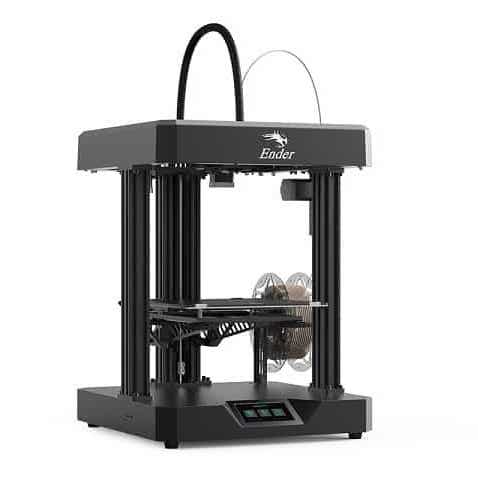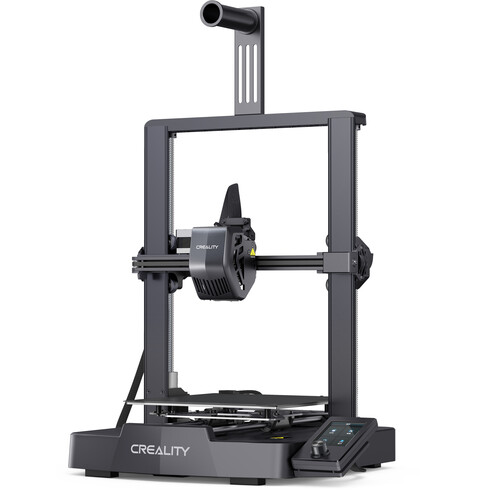Compare Ender 7 vs Ender 3 V3 SE
Comparison between the best 3D printers
Choose the best 3D printer at the best price. The cheapest 3D printers are here.
Buy a 3D printer here with 3D Fila.
 |
 |
|
| Model | Ender 7[BUY Ender 7] |
Ender 3 V3 SE[BUY Ender 3 V3 SE] |
| Printing Material | Filament | Filament |
| Buy Filament for Creality 3D Ender 7 | Buy Filament forCreality Ender 3 V3 SE | |
| Estimated price | $429,00 | $199,00 |
| Manufacturer | Creality 3D | Creality |
| Release Year | 2021 | 2023 |
| Print Volume [mm] | 250x250x300 | 220x220x250 |
| Printer Size [mm] | 430x460x570 | 420x366x490 |
| Weight [kg] | 17,2 | 7,34 |
| Power Loss Recovery | YES | NO |
| Enclosed printer | NO | NO |
| Bed Leveling | Manual | Automatic |
| Filament End Sensor | YES | NO |
| Bed type | Heated | Heated |
| Power supply system | Bowden | Direct Drive |
| Standard nozzle | 0,4 | 0,4 |
| Maximum Nozzle Temperature [°C] | 260 | 260 |
| Maximum Bed Temperature [°C] | 100 | 100 |
| Maximum printing speed [mm/s] | 250 | 250 |
| Filament holder | YES | YES |
| Camera for supervision | NO | NO |
| Recommended filaments | PLA, PETG, Tritan, Flex, ABS | PLA, PETG e TPU (95A+) |
| Recommended slicers | Cura, Simplify, Slic3r, IdeaMaker | Creality Print, Cura 5.0 ou superior, Prusa Slicer, Orca |
| Maximum Resolution [mm] | 0,1 | 0,1 |
| Processor | Creality CR-FDM V.2.4.S1_V101 32bits | 32-bit Silenciosa |
| Display | Display touchscreen 4,3'' | 3,2'' + Knob |
| Power Supply | 110/220V / 350W | 350 W |
| Connectivity | SD / USB | SD |
| Operating systems | Windows, Mac, Linux | Windows, Linux, Macbook |
| Date of registration in the system | 2022-11-04 | 2024-03-06 |
| Release date | 2021 | 2023 |
| Extra features | Crealitys Ender 7 printer offers remarkable print speeds, utilizing CoreXY kinematics for precise and fast movement. With a 250x250x300mm build area, dual direct extruder, and custom hotend, the Ender 7 is capable of printing at high speeds, although quality may suffer on smaller prints. Assembly is relatively straightforward, but the machine is noisy and can get hot. Its true speed potential is most noticeable on larger prints, where it outperforms its competitors. | The Ender 3 V3 SE stands out for its easy assembly, excellent automatic bed leveling, direct extrusion and easy interface, ideal for beginners. Although it uses a coated PC board, it offers robust performance, with print speeds of up to 250mm/s, thanks to a solid construction and linear rods on the Y axis. It lacks Wi-Fi, preferring file transfer via SD card. |
| Support for multiple colors and materials (AMS and CFS) | NO | NO |
Notes * |
||
| Cost-benefit | 7 / 10 | 7 / 10 |
| Hardware | 2 / 10 | 0.7 / 10 |
| Tela | . | . |
| Print volume | 4 / 10 | 3 / 10 |
| Performance | 2 / 10 | 2 / 10 |
| [BUY Ender 7] | [BUY Ender 3 V3 SE] |
Conclusion |
| In comparing the Ender 7 and Ender 3 V3 SE 3D printers, several key factors emerge that highlight the strengths and weaknesses of each device. The Ender 7, priced higher, offers an impressive print volume and utilizes advanced CoreXY kinematics, allowing for very high print speeds, which can be particularly advantageous for larger projects. However, it does come with challenges such as noise and heat generation, and it lacks certain convenience features like automatic bed leveling. On the other hand, the Ender 3 V3 SE, which is more budget-friendly, is designed with beginners in mind, featuring automatic bed leveling and a user-friendly interface. Its compact build volume and direct drive system provide good performance, making it an excellent choice for those new to 3D printing, despite its limitations in print volume and speed. Ultimately, the choice between the two models hinges on the user’s specific needs: the Ender 7 is appropriate for experienced users seeking high performance on larger prints, while the Ender 3 V3 SE is ideal for novices or those prioritizing ease of use and affordability. Each printer delivers solid value, but the decision will depend on the balance between budget, print requirements, and user proficiency. |

